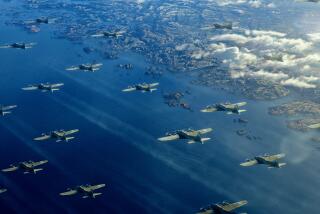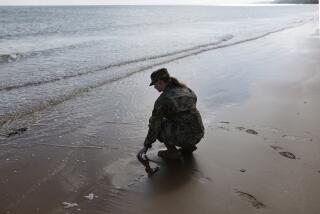Days of True Hope and Glory
I went to see the movie to be reminded and maybe amused by “Hope and Glory” . . . and I saw Johnny Staines, Neil Pannell, Pete Burbidge, Geoff Hillsdon, Terry Silver, all the cheeky little sods of my hopeful and glorious boyhood in London during World War II.
Writer/producer/director John Boorman also was a kid in splintered, rationed, wartime England. That’s what makes his movie such a super replica.
Yet he has not said precisely where he learned about the collectibility of shrapnel (chunks with German markings being worth infinitely more than blank shards) or how to fire a .303 rifle cartridge in a vise (they didn’t really fire, but kind of swoorooshed while the bullet wobbled all over the place) with a hammer and nail.
I suspect he was one class above me at school. Or was the chubby kid who watched from afar when we wouldn’t let him into our gang because his face was always covered by gentian violet dye and we might catch his impetigo and die. Or maybe Boorman used to be Johnny Staines.
Because we--Johnny, Neil, Pete, Geoff, Terry and young Dixie Dean here--were all the boys who created every moment of his movie.
When , in the film, the kids cheered Adolf Hitler for bombing their school . . . actually that was Southgate County and it was a V-2 rocket that sadly did no better than blow out most of the windows and put the chemistry lab out of commission for two weeks.
When the Spitfire shot down the Me109 . . . the pilot then flew straight up Stonard Road, opened his canopy, waved right at me and pulled a victory roll. I knew then I would join the Royal Air Force.
When Pauline’s mother was killed in an air raid . . . in truth, it was John Gentle’s father and we found one of his thumbs on the cinder running track in Broomfield Park. We took it to school and left it in John Gentle’s desk.
When the students filed into the air raid shelter and spoke their multiplication tables with gas masks on . . . we recited John Masefield and it sounded like: “Dirdy Bridish coaster with ids sald-caked smodestack budding up der Channel on a mad March dayd.”
But, oh joy of absolute wonders, as it is in the movie, we could and did blow into those gas masks and make great noises of incredible flatulence until the shelter seemed filled with elephants.
When mum pulled a fit at Waterloo Station and wouldn’t let her son and daughter be evacuated to Australia . . . it was indeed Waterloo Station, but my sister and I were only headed for Stevenage in the countryside outside London. Mother, however, still threw a fit and wouldn’t let us go.
When the daughter fell in love with the Canadian . . . my sister fell in love with a Bomber Command navigator named Ticky Stewart. I assisted the romance by every maneuver possible because Ticky was a reliable source of RAF survival knives worth their weight in Cadbury’s chocolate on our school black market.
I was very upset when Ticky was shot down over Hamburg and posted missing because I still owed Curly Wilkinson a survival knife.
When mother crouched with son and daughter beneath the stairs as bombs are shrieking down . . . my mother’s actual words were: “Oh God, this one has our name on it.” The bomb landed in our front yard but did not explode. I watched an Army demolition team haul it away and I could not see our name on it anywhere.
Looking back, I have no idea how we survived to sing at war’s end, at a school victory assembly, all the choruses of “Land of Hope and Glory” by Sir Edward Elgar.
We should have died before our teens. For we had no fear and the war was a lark that allowed us to run unbridled. And we ran in blissful ignorance of any hurt in a violent environment we made our playground.
We collected unspent German incendiary bombs because their magnesium made grand fireworks. By the age of 10, I knew how to remove the impact fuze from a shell and insert a primer in a hand grenade. And had access to both.
We were bombed week-after-month by conventional high explosives, V-1 buzzbombs that you could see (my first newspaper job was counting V-1s as they flew over North London and then telephoning the London Daily Mirror with the tally) and V-2 rockets no one saw before they killed.
Mother had a nervous breakdown because how long can you continue sending children to school with no promise of their return?
Yet she soldiered on and continued to feed us on whale meat and one egg a week . . . and shelter us without a husband to help because Dad was largely absent from 1939 to 1945 . . . and clothe us in Windbreakers and shorts stitched from leftover blackout drapes and old sheets. I didn’t taste a banana until I was 16.
Such memories, of course, will never be erased.
Incredibly, their props even return to haunt.
I recently brunched at Patrick’s Roadhouse in Santa Monica and owner Bill Fischler showed me his latest buy from the Antique Guild, still in its original cardboard box. It was a World War II gas mask from England.
I knew exactly how to put it on.
I recognized its feel, its rubbery smell.
You should have seen heads turn in horror at the great flapping, turgid, unsociable sounds it still produces.
More to Read
Only good movies
Get the Indie Focus newsletter, Mark Olsen's weekly guide to the world of cinema.
You may occasionally receive promotional content from the Los Angeles Times.









